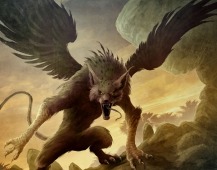Dr. Language Guy here.
It has come to my attention that many of you face a grammatical dilemma when encountering strange wildlife in your own backyard. Now I know that, if you sight wolves, deer or locusts, you will immediately call out “There is a pack of wolves or a herd of deer or a plague of locusts in my backyard!” Packs are common to a number of creatures – wolves, hounds and other dogs – as are herds – asses, buffalo, deer, elephants, giraffes, moose and zebras. Plagues only apply to locusts and politicians.
But what do you say if, for examples, you encounter baboons, sheldrake or wombats? Never fear. Thanks to the Book of Saint Albans of 1486 entitled Companys of Beestys and Fowlys, aided by Wikipedia and abcteach, you will correctly and properly identify any group of animals that cross your path. The animals will respect you for this attention to detail.
A Troop of Baboons
A Sedge of Bitterns
A Sounding of Boars
A Drove of Bullocks
A Tok of Capercaillie
A Quiver of Cobras
A Covert of Coots
A Bask of Crocodiles
A Murder of Crows
A Trip of Dotterel
A Fling of Dunlins
A Mob of Emus
A Fesnyng of Ferrets
A Bloat of Hippopotamuses
A Clattering of Jackdaws
A Deceit of Lapwings
An Ascension of Larks
A Plump of Moorhens
A Pod of Pelicans
An Ostentation of Peacocks
A Congregation of Plovers
A Rhumba of Rattlesnakes
A Crash of Rhinoceros
A Dopping of Sheldrake
A Walk of Snipes
A Pitying of Turtle Doves
A Wisdom of Wombats

A WTF? of Weird Wildlife
We should start applying such terms to groups of people as well:
A Brace of Bloggers
A Klump of Kardashians
A Really Good Deal of Used Car Salesmen.
Do you have any suggestions?
